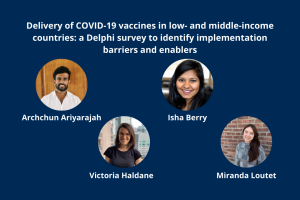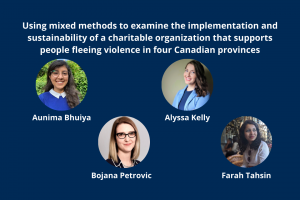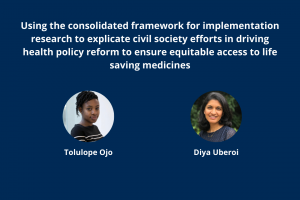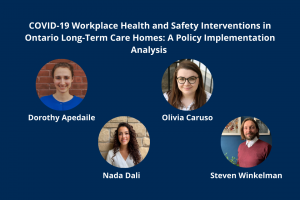DLSPH Implementation Science Trainee Cluster
The implementation science trainee cluster is composed of more than 20 graduate students from across DLSPH divisions and institutes. In small groups with representation of different disciplines within and outside health, the students are working on important global implementation science questions.
Students groups have their work guided by trainee leaders (including post-doctoral fellows) and program facilitators to produce a project research report (review, comparative study or implementation project) in 6-8 months through seminars, culminating in an IS research day at the end of the year.
An equity-focused evaluation of the COVID-19 vaccine rollout plans proposed by six Canadian provinces

Trainees: Vajini Atukorale, Kainat Bashir, Christoffer Dharma, Dane Mauer-Vakil, Mariame Ouedraogo, Mercedes Sobers
Faculty Mentors: Sara Allin, Shaza Fadel, Anushka Ataullahjan
Summary of Group:
Our six-person team of scientists includes PhD and MSc students following either the Health Services Research (IHPME) or Epidemiology (DLSPH) research tracks at the University of Toronto. Our group includes members of multiple ethnicities and lived experiences, with various research interests: implementation science, health equity, vaccines, mental health, maternal and child health and nutrition, and sexual health. Our diverse backgrounds drive our research interests into how various vulnerable groups are prioritized in the national COVID-19 vaccine rollout plan across multiple Canadian provinces.
Our multidisciplinary research team brings a wealth of expertise to the program, including those who already have a strong background in implementation science and knowledge translation. Some members have experience with infectious disease outbreak investigations, along with studying the effective communication of vaccine science and policy. Several members have expertise with community-based, participatory action research, including among marginalized or vulnerable populations. Our group as a whole has strengths in both qualitative and quantitative research methods, social network analysis, predictive modeling, performance measurement, and machine learning.
As a team, we are very interested in learning more about the approaches and methods to bridge the gaps between research evidence and its effective and sustainable translation into healthcare practice.
Summary of Project:
The most effective way to stop the negative impacts of the COVID-19 pandemic is through widespread vaccine coverage. Ensuring equitable distribution of the COVID-19 vaccines among populations facing higher viral transmission and barriers to vaccine access is also a key component of this effort. Our project aims to explore provincial variability in the prioritization of the COVID-19 vaccine in specific populations across six Canadian provinces (Alberta, British Columbia, Manitoba, Nova Scotia, Ontario, and Quebec). Following guidelines from the National Advisory Committee on Immunization, the populations of interest in this study are essential workers, Indigenous, Black, and South Asian Peoples, individuals with disabilities, and individuals facing homelessness. To address our study objective, we are considering, through an equity lens, the “Reach” dimension of the RE-AIM framework. This modified RE-AIM is used to review provincial vaccine strategies and media articles reporting on vaccine prioritization among our populations. We will subsequently perform key informant interviews to contextualize, validate, and supplement findings from our review. This study’s results and subsequent recommendations can serve as best practice guidelines for equitable vaccine distribution in Canada and any future emergencies.
Delivery of COVID-19 vaccines in low- and middle-income countries: a Delphi survey to identify implementation barriers and enablers

Trainees: Archchun Ariyarajah, Isha Berry, Victoria Haldane, Miranda Loutet
Faculty Mentor: Ross Upshur
Summary of Group:
The COVID Vaccine Consensus (CVC) Working Group is composed of DLSPH and IHPME PhD students in epidemiology and health services research (HSR), and is supervised by Dr. Ross Upshur. CVC members bring a breadth of research experience, with a focus on infectious diseases in low- and middle-income settings. Archchun Ariyarajah (PhD student, DLSPH, Epi) researches vaccine-preventable diseases. He has experience in outbreak response with the WHO in Sierra Leone and Haiti. As an IS trainee he is interested in implementation barriers to vaccination. Isha Berry (PhD candidate, DLSPH, Epi) researches emerging infectious diseases in South Asia. Her research leverages digital technology for health surveillance, including monitoring COVID-19 in Canada. As an IS trainee she is interested in translating research into policy. Victoria Haldane (PhD candidate, IHPME, Health Services Research) researches implementation science for infectious disease programs. She has experience conducting health systems research in Southeast Asia, including measuring COVID-19 impacts. As an IS trainee she is interested in how context shapes program outcomes. Miranda Loutet (PhD student, DLSPH, Epi) researches maternal and child health in Bangladesh. She has experience in public health and clinical infectious disease research across global settings. As an IS trainee she is interested in implementing impactful and sustainable health programs.
Summary of Project:
The COVID-19 pandemic has exacerbated challenges to healthcare across the world, especially in low- and middle-income countries (LMICs). Such challenges include limited healthcare resources, lack of personnel, economic insecurity, and more. These are further compounded by factors such as vaccine hesitancy and stigma surrounding care. Together these cross-cutting issues pose a threat to equitable and efficient vaccine delivery in LMICs. Currently, there is no consensus on the main challenges and solutions regarding vaccine delivery in these settings. Our study aims to determine the critical challenges in distribution, population prioritization, and administration for COVID-19 vaccine programs in LMICs and identify potential consensus-based solutions. Under the supervision of Dr. Ross Upshur, our student-led research team is conducting a three-round modified Delphi survey with almost 100 international vaccine experts from academic, industry, government, and non-government organizations. Surveys are being circulated to participants via email. Survey questions cover implementation challenges for vaccination programs under each research objective: distribution, population prioritization, administration, and solutions. Themes will be refined between each round based on responses. We anticipate that study findings can be used to support policymakers and providers gain a better understanding of implementation barriers and enablers, as well as provide direction for key stakeholders to ensure COVID-19 vaccines are effectively and equitably distributed globally.
Using mixed methods to examine the implementation and sustainability of a charitable organization that supports people fleeing violence in four Canadian provinces

Trainees: Aunima Bhuiya, Alyssa Kelly, Bojana Petrovic, Farah Tahsin
Faculty Mentors: Erica Di Ruggiero, Ilene Hyman
Summary of Group:
Alyssa Kelly is a second year PhD student in Health Services Research (Collaborative Specialization in Global Health) at IHPME. Her doctoral research focuses on examining contextual factors that influence the implementation of health interventions, and her interests pertain to health equity, population health, and health outcomes in low-resource settings. Alyssa currently works at the Office of Spread and Scale within the Women’s College Hospital Institute for Health System Solutions and Virtual Care. Farah Tahsin is a first year PhD student in Health Services Research at IHPME. For her doctoral thesis, she is studying the effects of low socioeconomic status on chronic patients’ usage of telehealth for self-management. Her research interest include evaluating sustainable technology-enabled care for at-risk populations. She currently works as a research analyst at the University of Toronto. Bojana Petrovic is a PhD candidate in Social and Behavioural Health Sciences at DLSPH. Bojana’s research interests include cancer care coordination, digital health, implementation science, program evaluation, and community-based research. She currently works as a Research Associate at the Department of Family and Community Medicine, University of Toronto. Aunima Bhuiya is an incoming PhD student in Health Services Research at IHPME. Her research interests include understanding the science and practice of knowledge translation and implementation science and health systems policy research. She currently works as a Co-Lead, Evidence Synthesis at the McMaster Health Forum with previous international experiences at the CDC and WHO.
Summary of Project:
Shelter Movers (SM) is a national non-profit organization that provides free moving and storage services to people experiencing intimate partner violence. The organization receives referrals from various social service agencies (primarily shelters and transitional homes) and mobilizes volunteers to safely move clients away from their abusive setting in a way that is person-centred and trauma-informed. Since it’s inception in 2016, SM has expanded to six cities across Canada, engaging over 700 volunteers who have dedicated 40,000 hours of service. The demand for this service has increased over the past year, due to reports of increasing frequency and severity of intimate partner violence during the COVID-19 lockdowns. Violence against women during COVID-19 has been referred to as the “shadow pandemic”, and to help address this urgent public health concern, SM is interested in expanding their reach to newer jurisdictions. This a timely opportunity to explore the strategies and resources that are required to ensure sustainable expansion of SM. This sustainability-implementation evaluation study aims to use a convergent mixed-method research design to: 1) evaluate the sustainability capacity of existing SM chapters using CDC’s Program Sustainability Assessment Tool (PSAT); 2) identify specific determinants (enablers and barriers) that influence implementation using the CFIR framework; 3) and co-create an action plan to enable SM chapters to optimize the potential impact and sustainability of their program.
Using the consolidated framework for implementation research to explicate civil society efforts in driving health policy reform to ensure equitable access to life saving medicines

Trainees: Tolulope Ojo, Diya Uberoi
Faculty Mentors: Lisa Forman, Lincoln Lau
Summary of Group:
Dr. Diya Uberoi is a postdoctoral fellow working with Prof. Lisa Forman at the Dalla Lana School of Public Health. Her research examines the potential of litigation to promote equitable health policy change. Specifically, she is interested in implementation science given its applicability to different fields, including law and the right to health. Tolu Ojo is a Ph.D. student at the Institute of Health Policy and Management and a Global Scholar in the Collaborative Specialization in Global Health supervised by Dr. Nav Persaud. She has previous experience designing and evaluating public health programs in low-resource settings. Her research interests are in program and health systems evaluation, focusing on access to essential medicines, specifically comparison of essential medicines program in low resource settings.
Summary of Project:
This study aims aims to describe the determinant, contextual, and process factors that shape how civil society organizations (CSOs) translate the universal standards of the right to health into relevant health policy for increased access to medicines in India and South Africa. Using the Consolidated Framework for Implementation Research (CFIR), we aim to explicate CSO’s experiences with litigation and social advocacy in lowering costs for life saving treatment and ultimately design valuable, transferable lessons for further application in other LMICs.
COVID-19 Workplace Health and Safety Interventions in Ontario Long-Term Care Homes: A Policy Implementation Analysis

Trainees: Dorothy Apedaile, Olivia Caruso, Nada Dali, Steven Winkelman
Faculty Mentors: Susan Bondy, Abi Sriharan
Summary of Group:
Dorothy Apedaile recently completed her MPH in Epidemiology from the Dalla Lana School of Public Health (DLSPH) and will begin a PhD in Epidemiology at DLSPH in September. Her research interests include occupational health and safety, gender-based violence, and data science. Olivia Caruso recently completed her MPH at DLSPH in the Social and Behavioural Health Sciences (Health Promotion). She will be starting her PhD in Geography at Western University in Fall 2021. She has interests in food access, child and youth health, and community development. Nada Dali is a MSc candidate in Health Services Research at the Institute of Health Policy, Management, and Evaluation at the University of Toronto and a graduate student at the Upstream Lab. Her research interests lie at the intersection of health equity, sustainability, and policy. Steven Winkelman recently completed his MPH at DLSPH in Social and Behavioural Health Sciences (Health Promotion) with a specialization in Public Health Policy. He is interested in LGBTQ2s+ health, health equity, and the implementation and evaluation of healthcare initiatives in non-clinical settings.
Summary of Project:
The COVID-19 pandemic presented significant health risks to both residents of and employees working in Ontario’s long-term care (LTC) sector. Since April 24, 2020, there were approximately 6,784 COVID-19 cases among staff in LTC homes. Throughout the pandemic period the Ontario provincial government rapidly released a number of policy interventions intended to protect LTC workers. To better understand these policies, their impact, and their implementation, this study has two primary research questions: 1) what occupational health and safety interventions were implemented by the Ontario provincial government to protect long-term care workers during the COVID-19 pandemic? and 2) what mechanisms and contextual factors influenced uptake and adherence to the interventions implemented by the provincial government across different long-term care homes and types of workers? This study will draw on an intersectionality-based policy analysis framework, as well as a narrative analysis of secondary sources, to examine the implementation and impact of occupational health and safety interventions targeting employees in Ontario’s LTC sector during COVID-19. The researchers plan to disseminate their findings through multiple means to reach key stakeholders, including publishing in a relevant, peer-reviewed academic journal and developing policy briefs for policymakers/advocates.